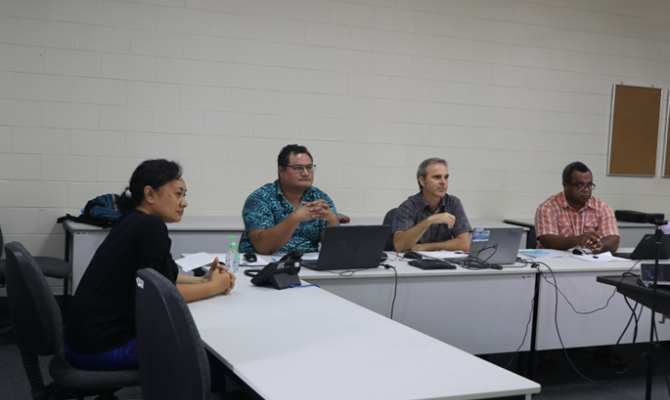
Following the successful launch of a series of virtual trainings on Environmental Impact Assessment (EIA) and Social Sustainability on 21 May, the second of a four-part training series was held on 27 May and focused on the ‘scoping’ component of the EIA process.
The Secretariat of the Pacific Regional Environment Programme (SPREP), in conjunction with the World Bank and the Asian Development Bank through the Pacific Learning Partnership for Environmental and Social Sustainability (PLP-ESS), delivered this second training on ‘EIA scoping’ with staff of the Environment and Conservation Division (ECD) of the Ministry of Environment, Lands and Agricultural Development (MELAD) in Kiribati.
As an atoll nation, Kiribati continues to endure capacity constraints to efficiently administer an effective EIA process to support its aspirations for sustainable development.
“The capacity of the ECD continues to be challenged with limited resources and expertise to support the EIA process; more-so now than ever as we receive increasing number of applications for environmental license as a direct result of a high volume of development projects in infrastructure, mitigation and adaptation initiatives to address climate change,” said Mr. Puta Tofinga, Senior Environment Officer ECD, Kiribati.
The training, attended virtually by 16 ECD officials, focused on improving the understanding of ‘EIA scoping’ within the EIA process, starting with the critical step of identifying potential adverse environmental, social and economic impacts of a proposed development activity, and the key elements for preparing a Terms of Reference (ToR) for the EIA report. Dr. Greg Barbara, Environmental Assessment and Planning Officer of SPREP, presented on the purpose and activities associated with EIA scoping, drawing guidance from SPREP’s regional EIA guidelines including an analysis of sections under the Kiribati’s Environment Regulation 2017 and Environment (Amendment) Act 2007 that supports scoping activities.
The training also discussed the role of the EIA Administrator as prescribed by the Environment Regulation 2017 and Environment (Amendment) Act 2007 as the approving authority responsible for issuing an environmental license.
“For Kiribati, this responsibility is assigned to the Principal Environment Officer who is Permanent Secretary of MELAD. ECD’s role is to ensure due diligence and best practice is carried out in all stages of the EIA process which culminates in a recommendation for a decision to the Permanent Secretary. Let me say that this training is part of our efforts to seek out best practices in EIA and thus, we hope to understand and apply the regional EIA guidelines prepared by SPREP and other trainings provided by the PLP-ESS. The EIA Scoping is one area that ECD will need to strengthen in the Kiribati EIA process.” said Mr. Tofinga.
Designed around guidance from the SPREP Regional EIA guidelines, participants of the training were taken through simple, step-by-step instructions on how the EIA process is implemented, including the step-by-step assessment of the ToR using an active project.
“The use of the checklist made it easier to guide our discussions on the minimal requirement needed for the ToR and more importantly, raise our awareness on how to engage with developers when preparing ToR for our review and approval,” said Ms. Victoria Hnanguie, Environmental Licencing Officer in ECD.
“I commend SPREP and PLP-ESS partnership for this initiative; it has enhanced my understanding of best practices in EIA which fits well with our efforts at implementing EIA process across our country. This is the second session of our EIA training, and I must say, that although it is different from the face-to-face training, the virtual training set-up by the PLP-ESS partners is very useful under the COVID-19 circumstances,” said Mr. Tofinga.
The series of EIA/ESS training for Kiribati ECD is scheduled to continue in the coming weeks with a further two trainings planned. The next training will involve staff undertaking a pre-exercise on reviewing a recent Kiribati EIA report and guided discussions on identifying key requirements for deciding on whether additional information is required and setting potential approval conditions and recommendations.
PLP-ESS is an agreed collaboration mechanism established in 2019 between SPREP, WB, ADB and USP to respond to the Pacific island countries capacity building needs related to environmental and social safeguard. This includes delivery of training, facilitation of the exchange of experiences and knowledge, mentoring trainees, developing curricula, and providing assistance related to the common objectives of ESS using the SPREP Regional EIA Guidelines as a key reference document.
For more information about the EIA/ESS training, or the PLP-ESS, please email us at [email protected], or visit www.sprep.org. [https://pnea.sprep.org/]